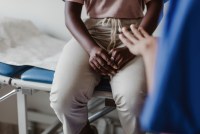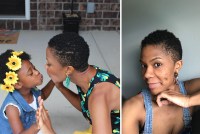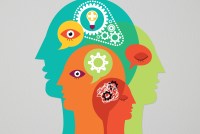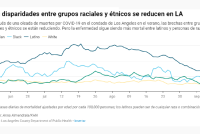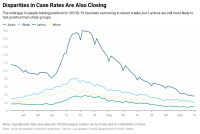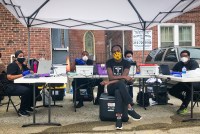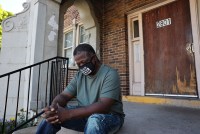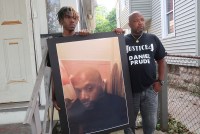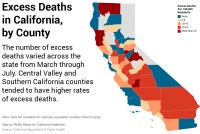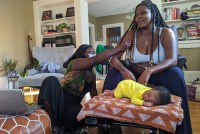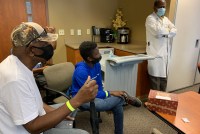Latest KFF Health News Stories
Family Mourns Man With Mental Illness Killed by Police and Calls for Change
Like almost a quarter of the 989 people killed by police in the U.S. in the past 12 months, Ricardo Muñoz had a serious mental illness. “Instead of a cop just being there, there should have been other responders,” his sister says.
Lo que los doctores no aprenden: a detectar el racismo en la atención médica
Cuando la raza interviene en los cálculos médicos, puede conducir a tratamientos menos eficaces y perpetuar las desigualdades basadas en la raza.
What Doctors Aren’t Always Taught: How to Spot Racism in Health Care
Activists across the country are demanding that medical schools eliminate the use of race as a diagnostic tool, recognize how systemic racism harms patients and reckon with some of medicine’s racist history.
Black Hair Matters: How Going Natural Made Me Visible
How do we as Black people protect ourselves from racism? In our household, my decision to let my hair go natural forced my father and me to have a conversation about personal safety, the police and my desire to feel free. He viewed my permed hair and weave as a protective shield that increased my chances of making it home safely. But, in reality, my haircut — long or short — can’t protect me from racism.
Poor and Minority Children With Food Allergies Overlooked and in Danger
Having a child with a food allergy is terrifying for any parent, but for low-income families such allergies can be especially deadly. Food assistance programs and food pantries rarely take allergies into account. And access to specialists, support groups and lifesaving epinephrine can be hard to attain. This especially hurts low-income Black children, who have higher incidences of allergies to corn, wheat and soy than white kids.
Readers and Tweeters Shed Light on Vaccine Trials and Bias in Health Care
Kaiser Health News gives readers a chance to comment on a recent batch of stories.
“Todo lo que quieres es que te crean”: el prejuicio inconciente en la atención de salud
Los latinos y los afroamericanos suelen ser menos propensos a recibir analgésicos o atención avanzada que los pacientes blancos no hispanos con las mismas quejas o síntomas.
‘All You Want Is to Be Believed’: The Impacts of Unconscious Bias in Health Care
One woman shares her experience trying to get care in a Bay Area hospital for COVID symptoms. At nearly every turn, a doctor dismissed her complaints. Is bias part of why people of color are disproportionately affected by the coronavirus?
COVID en LA: prevención en los trabajos ha salvado vidas de latinos, dicen oficiales
La agresiva aplicación de las normas de salud y la apertura de líneas para denunciar si no se cumplen han contribuido a la disminución de muertes.
COVID Crackdowns at Work Have Saved Black and Latino Lives, LA Officials Say
Strict enforcement of coronavirus protocols at factories and shops where some of the worst outbreaks have occurred has reduced the racial and ethnic disparities in COVID deaths and illness, say public health officials. They want to expand the effort by creating workplace safety councils.
Black Doctors Work to Make Coronavirus Testing More Equitable
The Black Doctors COVID-19 Consortium has increased access to coronavirus testing in the Philadelphia region, testing more than 10,000 people. The group’s mobile unit and pop-up testing sites also offer patients an opportunity to connect with African American health care providers.
Evictions Damage Public Health. The CDC Aims to Curb Them ― For Now.
A survey of 17 cities found more than 50,000 pandemic-related eviction filings. Housing advocates worry that increased housing instability will lead to more COVID-19 and other illnesses.
The First Presidential Debate: A Night of Rapid-Fire Interruptions and Inaccuracies
Tuesday night’s presidential debate offered voters their first side-by-side comparison of the candidates, President Donald Trump and former Vice President Joe Biden.
‘You’re Going to Release Him When He Was Hurting Himself?’
Daniel Prude’s family knew he needed psychiatric care and tried to get it for him. Instead, his encounter with police hours after he was released from Strong Memorial Hospital in Rochester, New York, proved fatal.
KHN and California Healthline staff made the rounds on national and local media this week to discuss their stories. Here’s a collection of their appearances.
California’s Deadliest Spring in 20 Years Suggests COVID Undercount
California’s death count for the first five months of the pandemic was 13% higher than average for the same period during the prior three years. Subtract the deaths officially attributed to COVID-19 and experts say that still leaves scores of “excess” deaths among people of color that likely were mistakenly excluded from the coronavirus death tally.
Urban Hospitals of Last Resort Cling to Life in Time of COVID
Rural hospitals have been closing at a quickening pace in recent years, but a number of inner-city hospitals now face a similar fate. Experts fear that the economic damage inflicted by the COVID pandemic is helping push some of these urban hospitals over the edge at the very time their services are most needed.
Black Women Turn to Midwives to Avoid COVID and ‘Feel Cared For’
Midwifery was a tradition among slaves from Africa, but in more recent decades, pregnant Black women have generally shunned the approach. Now, home births and midwives are making a comeback in the Black community.
COVID Vaccine Trials Move at Warp Speed, But Recruiting Black Volunteers Takes Time
The National Institutes of Health has suggested minorities should be overrepresented in COVID-19 vaccine trials — perhaps at rates that are double their percentage of the U.S. population. But efforts to recruit patients from racial minority groups are just beginning, while some trials have already advanced to phase 3.
‘It Seems Systematic’: Doctors Cite 115 Cases of Head Injuries From Crowd Control Devices
In the most comprehensive tally of such injuries to date, the Physicians for Human Rights scoured publicly available data — including social media, news accounts and lawsuits — to document and name victims of summer protests. Still, the group cautions, it’s likely an undercount.




